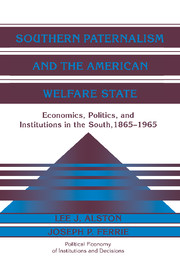 Southern Paternalism and the American Welfare State
Southern Paternalism and the American Welfare State Book contents
- Frontmatter
- Contents
- Preface
- Introduction
- 1 The Economics of Paternalism
- 2 The Politics of Maintaining Paternalism
- 3 Southern Opposition to the Social Security Act
- 4 Southern Opposition to the Farm Security Administration
- 5 The Bracero Program and Wartime Farm Labor Legislation
- 6 Mechanization and the Disappearance of Paternalism
- Conclusion
- References
- Index
- Titles in the series
4 - Southern Opposition to the Farm Security Administration
Published online by Cambridge University Press: 05 May 2010
- Frontmatter
- Contents
- Preface
- Introduction
- 1 The Economics of Paternalism
- 2 The Politics of Maintaining Paternalism
- 3 Southern Opposition to the Social Security Act
- 4 Southern Opposition to the Farm Security Administration
- 5 The Bracero Program and Wartime Farm Labor Legislation
- 6 Mechanization and the Disappearance of Paternalism
- Conclusion
- References
- Index
- Titles in the series
Summary
Introduction
Because social insurance had great appeal across the nation, it was harder to fight than programs aimed narrowly at reform in agriculture and Southern agriculture in particular. But even after the threat to paternalism raised by the Social Security Act had been defeated, the federal government remained interested in pursuing policies like those of Federal Emergency Relief Administration (FERA) described at the start of Chapter 3 that addressed rural poverty specifically. Though the fight to exclude agriculture from social insurance programs had been won by the South in 1935, the federal government sharpened its focus on rural poverty in 1937. The Farm Security Administration (FSA) represented intervention in Southern labor relations to alter the relative economic power of landowners and laborers, and then to leave them free to contract among themselves.
The history of the FSA provides a clear example of the difficulty the Southern elite faced in preventing federal intervention in the South's system of labor relations, even as the region sought federal dollars. This episode also illustrates the lengths to which the elite would go to preserve the system of paternalistic relations between them and their dependent laborers and the economic benefits the elite derived as a result. The threat that the FSA posed to the South's system of paternalism was the FSA's role as an intermediary between landlords and tenants. But the FSA's exclusive focus on agriculture left it without a broad base of popular support when the Southern rural elite turned to face that threat.
- Type
- Chapter
- Information
- Southern Paternalism and the American Welfare StateEconomics, Politics, and Institutions in the South, 1865–1965, pp. 75 - 98Publisher: Cambridge University PressPrint publication year: 1999


